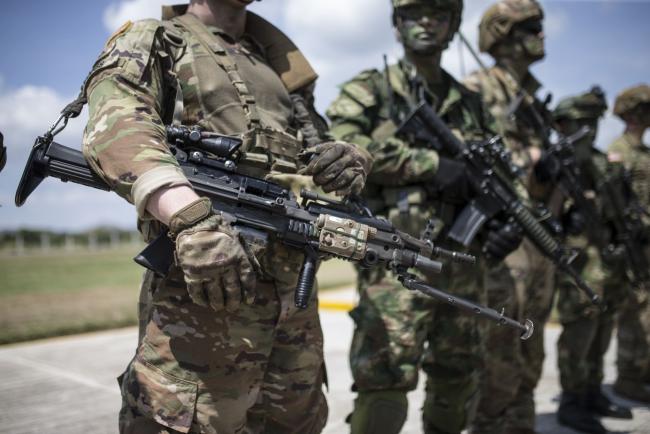(Bloomberg) -- President Joe Biden plans to request $813.3 billion in national security spending -- including $773 billion for the Pentagon -- in the federal budget he will send to Congress on Monday, according to officials familiar with the plan.
It’s an increase of $31 billion, or 4%, from approved spending for the current fiscal year and about $43 billion more than the White House budget office had projected a year ago for fiscal 2023.
The full national security budget includes spending for the Defense Department, the Energy Department’s nuclear weapons and the FBI’s national security functions. The officials familiar with the budget plan asked not to be identified before its release.
The budget reflects the increasing military challenge from China and the development of costly new defense systems -- from upgrading the nation’s aging nuclear arsenal to development of new hypersonic weapons. It was completed with an expectation that Russia was likely to invade Ukraine and some defense spending was shifted accordingly. Support in Congress is likely to be buoyed by the added challenge of confronting Russia.
The request will include $130.1 billion for research and development --the Pentagon’s largest-ever request in that category -- that will be steered to categories such as accelerated research into hypersonics and artificial intelligence. That’s about $15.6 billion more than the budget office had projected last year.
A White House official who was granted anonymity to discuss the spending plan, said it marked one of the biggest national security investments in American history that would strengthen U.S. allies in Europe and the Indo-Pacific and provide assistance to Ukraine.
The administration requested $145.9 billion for procurement, about $9.4 billion more than projected last year. Among items on the to-buy list: 61 F-35 jet fighters from Lockheed Martin Corp (NYSE:LMT)., fewer than previously planned, as well as initial procurement of the B-21 bomber from Northrop Grumman Corp (NYSE:NOC). and two Virginia-class submarines from General Dynamics Corp (NYSE:GD). and Huntington Ingalls (NYSE:HII) Industries Corp.
The budget request will also call for as much as $548 million in improvements to the nuclear submarine industrial base.
The national security request typically constitutes about half of the entire discretionary federal budget that’s approved by Congress. The White House has yet to release either its National Security Strategy or the Pentagon-generated National Defense Strategy that are supposed to outline the strategic rationale for the spending.
Biden signed into law $782 billion for national defense activities in the current year, a $32.5 billion increase over fiscal 2021 levels. Out of that the Pentagon’s discretionary spending slice is $728.5 billion.
Inflation Concern
There’s continued willingness both among Republicans and some key Democrats to increase defense spending.
“Congress almost certainly will further increase the Pentagon’s budget due to the Russian invasion of Ukraine, concerns about China and the military balance in the Indo-Pacific, and inflation,” said Stacie Pettyjohn, senior fellow and director of the defense program at the Center for a New American Security. She said inflation will affect all of the defense budget, particularly personnel costs, “which are at a historic high despite the fact that the force has been shrinking.”
Republican members of the House and Senate Armed Services panels -- led by Representative Mike Rogers (NYSE:ROG) of Alabama and Senator Jim Inhofe of Oklahoma--have been pressing Biden to request a national security budget for 2023 that would account for inflation plus an additional 5% over the $782 billion enacted for this year.
While inflation most immediately eats into fuel and military pay and benefits, it also affects weapons procurement contracts.
“While the higher number for defense this year over last year’s projections recognizes the problem of inflation, it still creates a problem for the Hill in that it is not enough,” said MacKenzie Eaglen, a defense budget expert with the American Enterprise Institute. “If the president’s defense budget for 2023 fails to keep pace with inflation and does not even grow at the levels seen in the recently passed omnibus spending bill for 2022,” Congress will insist on larger increases, she said in an email.
(Updates with analyst comment in 12th paragraph)
©2022 Bloomberg L.P.
